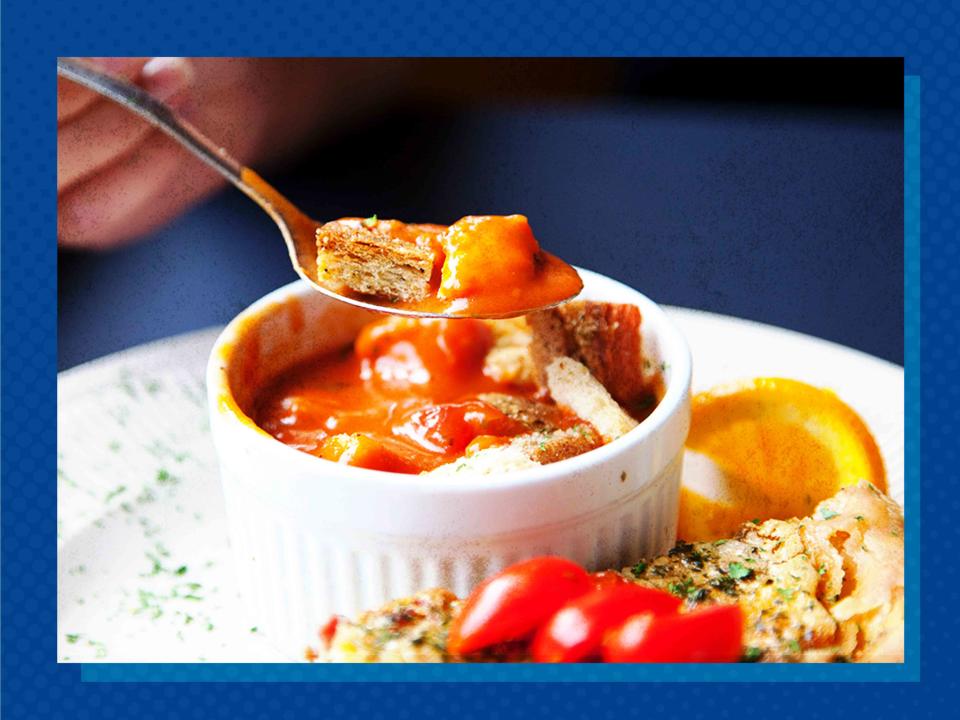Here’s Why You Might Not Want to Order the Soup of the Day, According to a Chef
What to know about soup "specials."

Kevin Miyazaki/Allrecipes
Restaurant specials, like a “soup of the day,” allow chefs to prepare something atypical and creative that isn’t a regular item on the menu. And, these specials are often delicious and worth ordering when given the opportunity to do so. However, in some scenarios the featured items or specialties of the day actually aren’t so special after all—in fact, they could consist of randomly selected, low-quality, or bulk-batch ingredients made prior.
The soup of the day is one specialty item that’s particularly susceptible to skepticism or hesitation, and whether or not it’s a good option depends on the restaurant’s reputation and chef, as well as a few other factors, such as how informed the staff is about ingredients and preparation or how often the same soup is served during the week. Before ordering it, consider these factors.
The Ingredients Are Ambiguous
While generally harmless, a soup of the day can seem suspicious at times, especially when ingredients aren’t specified or written down on the menu. A lack of information can surely raise eyebrows since it’s hard to ensure freshness and quality. In some cases, the featured soup is crafted with a purpose, where the ingredients complement one another seamlessly. But it’s not always guaranteed, and these mystery ingredients may not have been designed with intent and are actually just a hodgepodge of foods sitting around the kitchen about to spoil.
Ask for details and specifics before ordering to see how much information they provide. If little insight is available, you might want to rethink it and order something else. “For instance, some people might need clarification about whether the soup is truly made fresh daily or if it's a way for the restaurant to use up leftover ingredients from previous days,” explains Jessica Randhawa, head chef, recipe creator, photographer, and writer behind the blog, The Forked Spoon.
It Might Be Frozen and Not Fresh
There’s a possibility the soup of the day isn’t fresh or prepared daily, but rather, it had been cooked in bulk and stored in the freezer for later use. A good indicator of this is if the selection doesn’t rotate often. “Others might be wary if the soup of the day seems the same every time they visit, suggesting that it's not changing daily as the name implies,” Randhawa notes.
Here’s a tip: If a specialty soup is offered consecutively, or even a few times during the week, it could be a red flag. “In some instances, a soup of the day might be a soup that was made in bulk some time ago, and the leftovers were frozen, only to be reheated as the soup of that day,” Randhawa explains. If you frequent the restaurant enough to check for variety, you’ll be able to recognize any patterns. If you’re concerned, hold off on ordering soup of the day until you’ve dined a couple of times to see whether or not the selection is variable first. If it does tend to rotate throughout the week, it’s probably safe to give it a shot.
You may want to avoid ordering soup of the day from fast-casual restaurants or places where you’re unable to deem it reliable. “I have no problem ordering soup of the day from a restaurant that is known to be reputable when it comes to fresh ingredients,” Randhawa says. “While I try not to visit poorly rated restaurants, if I am in a pinch while traveling, I generally avoid any soup of the day,” Randhawa continues. So, follow her lead, here, to be safe.
It Could Be Packaged or Processed
Depending on where you’re dining, the soup of the day could be pre-packaged and processed, meaning it’s not even cooked in-house. It’s definitely not fresh or made daily, and may even have high levels of unhealthy ingredients and additives, too. “The best soups to order at a restaurant are always the ones that require hard-to-find ingredients or take a long time to make at home as well, such as a cioppino or a bouillabaisse,” Randhawa explains.
“If you're at a lower-end restaurant or diner, the soup may be something other than homemade, but rather reheated from a can or pre-packaged mix,” Randhawa says. Unfortunately, these types of soups are often high in sodium, preservatives, and artificial flavors, Randhawa notes. Use your best judgment and consider the type, the ingredients, and the restaurant’s credibility when making a selection. Have realistic expectations, and you’ll know what to do.

